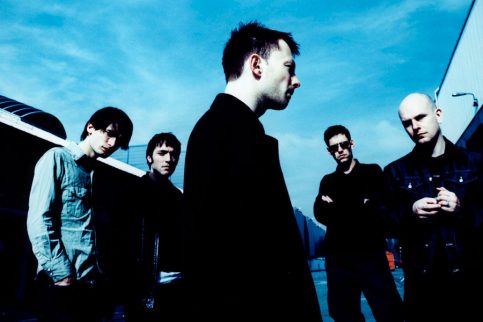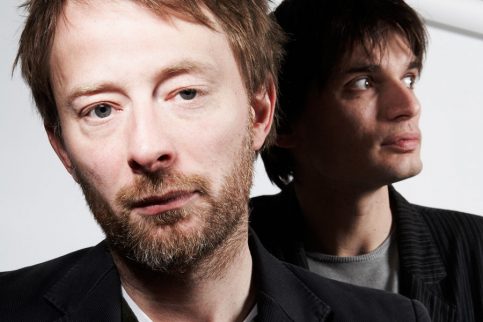In 1996, while most major British bands were blowing their royalties on cocaine, light aircraft, Patsy Kensit and Hampstead piles, Radiohead did something quite different. They spent a big chunk of what they’d earned on building an entirely new studio and filled it with a variety of exotic types of pricey, abstract and futuristic noise-making devices. At a time when their contemporaries were just whacking the Boss Super Overdrive through the Rat pedal and getting on with it, they were obsessed with chasing a rainbow of sounds no-one had ever heard before. It drove them to the edge of madness, and built ‘OK Computer’.
Ten years later, making ‘In Rainbows’, they were again pushing their talents to the limit in pursuit of innovation. In this case, that meant Jonny Greenwood at one point going away to write an entire piece of software that would allow them to control various sound modules they wanted to use. Jonny spent several weeks with his programmer’s hat on, working on it. It was a level of obsessiveness that led Thom Yorke to claim that he wasn’t entirely sure the group could make it through another album cycle unless they changed their MO.

So they did. ‘King Of Limbs’ was built specifically to find a unique third way between being an electronic act (programming sequencers) and being a rock band (chopping out chord progressions) – one that ultimately involved them sampling their own playing, then mixing it into new compositions.
Radiohead have spent a good deal of their lives banging their heads against a series of sonic brick walls in search of something better. They’re a reminder that innovation often isn’t glamorous. It isn’t a switch you press. No-one steps into the Innovator 3000 and sets the dial for ‘2017’. It is an endless onward trudge into the unknown that involves a hundred blind alleys and tedious cul-de-sacs. It has taken a man as self-lacerating and neurotic as Thom Yorke, and a guy as rigidly disciplined as Jonny Greenwood, to make the ‘Pablo Honey’ hit-makers into a group who have shaped and reshaped the history of rock on at least three separate occasions.
Considering the way that they have pushed music forward, you could build a case for them as The Beatles of the 21st century. After all, more than anyone still cutting it, they’ve challenged precisely what it is to sound like a huge mainstream act. Just look at ‘King Of Limbs’: probably the most eagerly anticipated record in history and one that consisted mainly of wispy, fractal rhythm patterns and diaphanous swirls of electric noise. While the surface world of rock’n’roll was swept along on The Strokes for a decade, the disciples of ‘OK Computer’ and ‘Kid A’ were quietly laying a new foundation for 21st-century music; one that cared not for reductive genre boxes but expected boundary-leaping experimentation from artists as standard. As if it wasn’t enough that their first rock-heavy incarnation had inspired Muse, Coldplay and Elbow and their later minimalist electronic dabblings had fathered a whole host of followers such as Foals, Alt-J and Django Django, Radiohead’s exploratory modernist mentality is now the norm, from Future Islands to The xx to Metronomy to James Blake and way, way beyond.

But they’ve also been our generation’s Beatles in the way they’ve caused all the clichés of the biz and stardom to warp and fold beneath their massive cultural gravity. The Beatles had Apple Corp, psychedelic feature films, writing all your own songs, the pop concept album, and cross-cultural pollination. Radiohead have given us one of the first recorded instances of streaming (via iBlip as far back as 2000’s ‘Kid A’); the Scotch Mist webcasts; apps like 2013’s PolyFauna, designed to explore the interzones between art, tech and music; and the ‘newspaper album’ on ‘King Of Limbs’ – not to mention rewiring the music industry with the pay-what-you-want scheme for ‘In Rainbows’, their own social network, and any number of genre-inverting videos from ‘Just’ to ‘House Of Cards’, in which “64 lasers rotating and shooting in a 360-degree radius 900-times per-minute produced all the exterior scenes”.
Nowadays, everyone from Beyoncé to Bowie has dropped secret albums that they’ve been working on under a thicket of non-disclosure agreements. Artists have been bitching about their record labels since Thomas Edison first put a stylus on a wax cylinder. But Radiohead have been much better than most at finding interesting ways to cut through all the crap. If Cobain was a teenage whine against corporate rock whores, they are a more mature, wily response; flag-bearers for an independence that isn’t just about the refusenik ideals of keeping it real in the back of a van with Henry Rollins. One that’s more about feeling free to use the full weight of the system to make it do what you want, and which involves making a wraparound concept of art-plus-music-plus-life that doesn’t feel aggressively artsy, like it might with a Byrne or an Eno.

The natural tension between the scale of their popularity and the modest limits of their lust for glory has always made them a subversive proposition. In 2000, they stood at the peak of their commercial potential. How did they capitalise on it? They refused to release any singles from ‘Kid A’, an album of soupy electronica. Then they toured the country in a white, sponsorship-free marquee because Thom had read Naomi Klein’s anti-marketing classic No Logo.
Thom has pushed the-personal-as-the-political into more interesting and satisfying spaces. He has become a standard-bearer for a generation suspicious of big, flag-waving sentiment. It’s a very 21st-century kind of politicking – somewhere between Russell Brand’s ‘don’t vote’ nihilism and the kind of DIY community ethic you might spot on Portlandia. They are a reflection of how, unlike our parents’ generation, who waved the flag and bashed the barricades, getting the Powers That Be to change the world is often not as helpful or fulfilling as making your own small-scale change where you can.

Just as The Beatles came to embody the ’60s, Thom Yorke is the rock star who most clearly reflects our times. Two decades ago, he looked into the future and it weirded him out. What he saw crushed him under the weight of its haste, its twisted crony-capitalist logic, its avalanche of prescription meds, its technological shrinking of life and society until you’re never alone but always alone. He articulated something that spoke to the way we live now, demonstrated an uncomfortable angst that connects Muse (at first widely dismissed as ‘Radiohead copyists’) with Bloc Party, Everything Everything with Burial. They even cut old-school dust-on-the-tapeheads tracks with no less a Luddite than Jack White. It’s just one more wrong-footing from a band who only seem to find their balance when they’re throwing everyone else off theirs.

You must be logged in to post a comment Login